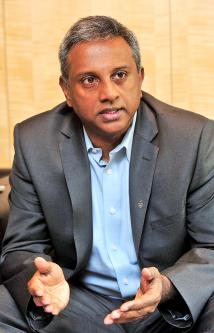Taiwan has made significant progress in the past 30 years in terms of human rights protection, Amnesty International (AI) secretary-general Salil Shetty said yesterday.
However, he said there is still room for improvement — especially when it comes to police brutality and the use of torture against peaceful demonstrators.
On his first visit to Taiwan, Shetty said it does not feel like an unfamiliar country, because AI, along with other global human rights organizations, have worked with Taiwan before, including efforts to rescue political prisoners during the Martial Law era.
After several days in the country, which has included traveling down to Greater Kaohsiung, Shetty said he has enjoyed Taiwan’s landscape and people’s dynamism and energy, especially when it comes to human rights issues.
“I believe events in the past two or three months, such as the Sunflower movement, have been helpful in raising public awareness and increasing involvement in human rights campaigns,” Shetty said in an interview with the Taipei Times yesterday.
However, when it comes to how the government responded to those demonstrations, Shetty shakes his head.
“We haven’t made detailed research, but from all the assessments we’ve made so far, there have been several cases in which the police have used excessive force in crowd control, especially when facing peaceful, sitting demonstrators,” he said. “In a democratic society, peaceful assembly is a fundamental right of the people — it is also stated in the Taiwanese Constitution — and it is the government’s responsibility to protect it.”
“The use of public spaces for public protests is a legitimate use, as long as it’s for peaceful demonstration,” he added.
Shetty said that, for instance, the use of water cannons against peaceful demonstrators is in violation of international human rights standards. “There is a set of UN guidelines for police handling of public protests, which especially stresses the point that all measures must be ‘necessary’ and ‘proportional,’” he said.
Shetty said he brought up the issue in a meeting with Vice President Wu Den-yih (吳敦義) on Friday and called on the government to take immediate action on allegations and complaints of excessive use of force by the police, as well as provide better training for police crowd control and revise the Assembly and Parade Act (集會遊行法), which falls outside of international standards.
Speaking about the death of late army corporal Hung Chung-chiu (洪仲丘) and the cases of death-row inmates Cheng Hsing-tse (鄭性澤) and Chiu Ho-shun (邱和順), Shetty said the three cases show that — long after Martial Law was lifted in 1987 — torture still exists in the nation, since Hung died of torture, while Cheng and Chiu have both said that they were tortured to extract the confessions that led to their death sentence.
“Besides the issue of torture, reforms should be made in giving prisoners proper medical treatment — for instance, your former president Chen Shui-bian [陳水扁] is suffering because he has not received proper treatment,” Shetty said.
“Overcrowding in most prisons is also not good for prisoners’ health,” he added.
Shetty said that although Wu listened to him closely and expressed agreement, he remains skeptical about whether the vice president is serious about making changes.
“In AI, we go by actions, not words,” he added.
Asked about recent public calls for capital punishment for Cheng Chieh (鄭捷), the suspect in the deaths of four people in a knife attack that also wounded 24 on Taipei’s Mass Rapid Transit system last month, Shetty said that while AI members would stand in sympathy and solidarity with victims and their families, “we do not support the death penalty.”
“When we started the anti-death-penalty campaign three decades ago, there were only 30 countries without the death penalty. Now, there are only about 30 countries that still have it,” he said. “Research shows that the death penalty has nothing to do with the crime rate. In fact, the crime rate has fallen in many countries where the death penalty was abolished.”
“The question to ask is why the government is unable to prevent the crime in the first place,” he added.
Shetty also urged Taiwanese to show more concern about human rights violations in China.
“Taiwan has geographical proximity to China, which has grown economically, but does not respect human rights,” he said. “Taiwan shows the contrast: You have economic growth with human rights protection.”
“However, if you want to sustain economic growth and social stability, you need to have more freedom,” Shetty said.
Source: Taipei Times - 2014/06/01





















